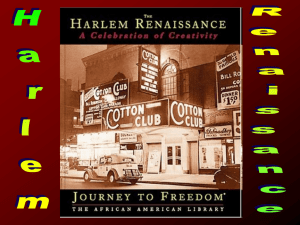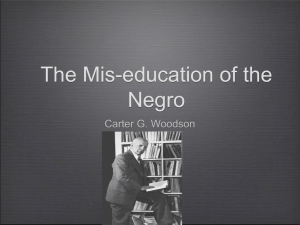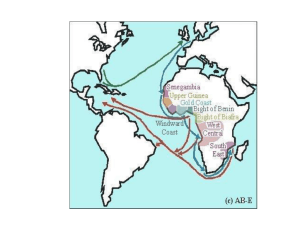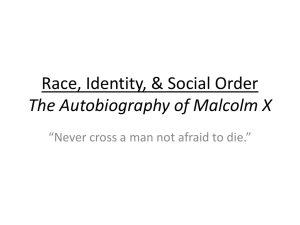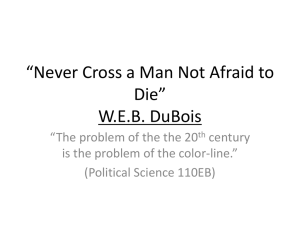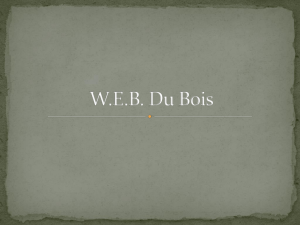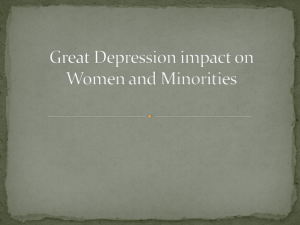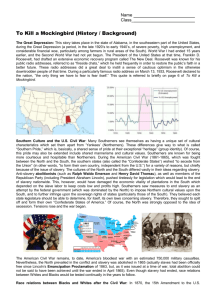Blacks and the Great Depression
advertisement
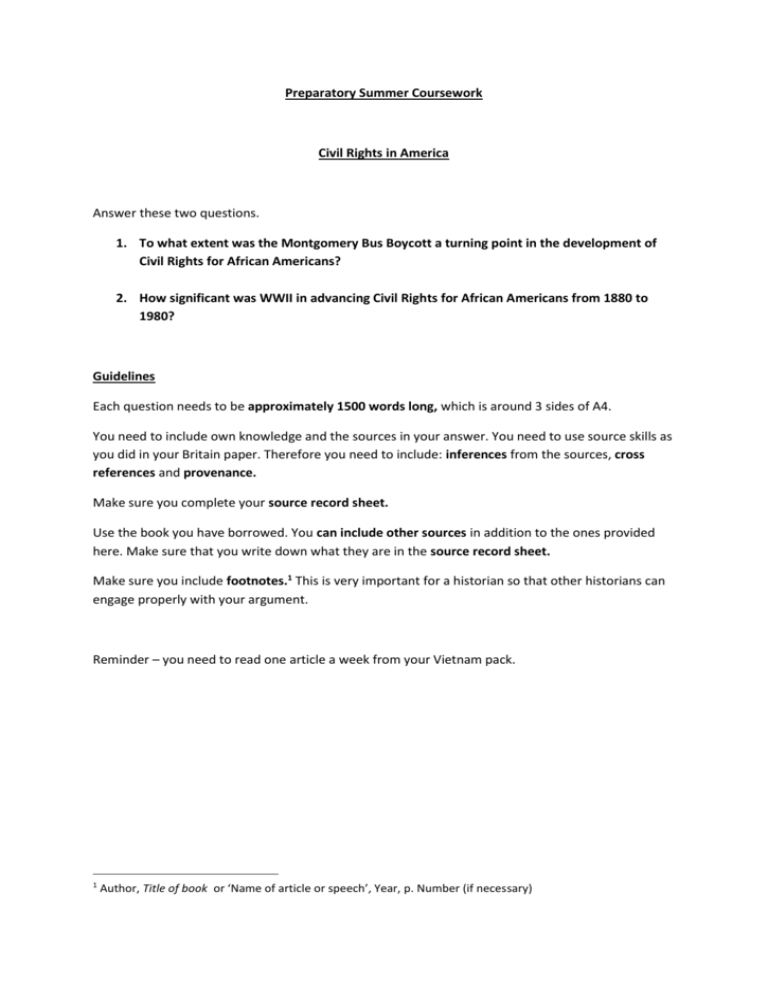
Preparatory Summer Coursework Civil Rights in America Answer these two questions. 1. To what extent was the Montgomery Bus Boycott a turning point in the development of Civil Rights for African Americans? 2. How significant was WWII in advancing Civil Rights for African Americans from 1880 to 1980? Guidelines Each question needs to be approximately 1500 words long, which is around 3 sides of A4. You need to include own knowledge and the sources in your answer. You need to use source skills as you did in your Britain paper. Therefore you need to include: inferences from the sources, cross references and provenance. Make sure you complete your source record sheet. Use the book you have borrowed. You can include other sources in addition to the ones provided here. Make sure that you write down what they are in the source record sheet. Make sure you include footnotes.1 This is very important for a historian so that other historians can engage properly with your argument. Reminder – you need to read one article a week from your Vietnam pack. 1 Author, Title of book or ‘Name of article or speech’, Year, p. Number (if necessary) Sources (4) Statement on Booker T. Washington signed by William Du Bois and twenty-two other African Americans (26th October, 1910) The undersigned Negro-Americans have heard, with great regret, the recent attempt to assure England and Europe that their condition in America is satisfactory. They sincerely wish that such were the case, but it becomes their plan duty to say that Mr. Booker T. Washington, or any other person, is giving the impression abroad that the Negro problem in America is in process of satisfactory solution, he is giving an impression which is not true. We say this without personal bitterness toward Mr. Washington. He is a distinguished American and has a perfect right to his opinions. But we are compelled to point out that Mr. Washington's large financial responsibilities have made him dependent on the rich charitable public and that, for this reason, he has for years been compelled to tell, not the whole truth, but that part of it which certain powerful interests in America wish to appear as the whole truth. Today in eight states where the bulk of the Negroes live, black men of property and university training can be, and usually are, by law denied the ballot, while the most ignorant white man votes. This attempt to put the personal and property rights of the best of the blacks at the absolute political mercy of the worst of the whites is spreading each day. (7) Letter sent to the Attorney General Harry Daugherty, by Harry Pace and eight other people from New York City ( 15th January, 1923) As the chief law enforcement officer of the nation, we wish to call your attention to a heretofore unconsidered menace to harmonious race relationships. There are in our midst certain Negro criminals and potential murderers, both foreign and American born, who are moved and actuated by intense hatred against the white race. These undesirables continually proclaim that all white people are enemies to the Negro. The movement known as the Universal Negro Improvement Association has done much to stimulate the violent temper of this dangerous element. Its president and moving spirit is one Marcus Garvey, an unscrupulous demagogue, who has ceaselessly and assiduously sought to spread among Negroes distrust and hatred of all white people. The official organ of the Universal Negro Improvement Association, The Negro World, of which Marcus Garvey is managing editor, sedulously and continually seeks to arouse illfeeling between the races. Universal Negro Improvement Association is composed chiefly of the most primitive and ignorant element of West Indian and American Negroes. The so-called respectable element of the movement are largely ministers without churches, physicians without patients, lawyers without clients and publishers without readers, who are usually in search of "easy money". In short, this organization is composed in the main of Negro sharks and ignorant Negro fanatics. (8) Marcus Garvey, Philosophy and Opinions (1923) The Universal Negro Improvement Association for five years has been proclaiming to the world the readiness of the Negro to carve out a pathway for himself in the course of life. Men of other races and nations have become alarmed at this attitude of the Negro in his desire to do things for himself and by himself. This alarm has become so universal that organizations have been brought into being here, there and everywhere for the purpose of deterring and obstructing this forward move of our race. Propaganda has been waged here, there and everywhere for the purpose of misinterpreting the intention of this organization; some have said that this organization seeks to create discord and discontent among the races; some say we are organized for the purpose of hating other people. Every sensible, sane and honestminded person knows that the Universal Negro Improvement Association has no such intention. We are organized for the absolute purpose of bettering our condition, industrially, commercially, socially, religiously and politically. (8) Philip Randolph, statement made on the proposed March on Washington (15th January, 1941) Negro America must bring its power and pressure to bear upon the agencies and representatives of the Federal Government to exact their rights in National Defense employment and the armed forces of the country. I suggest that ten thousand Negroes march on Washington, D. C. with the slogan: "We loyal Negro American citizens demand the right to work and fight for our country." No propaganda could be whipped up and spread to the effect that Negroes seek to hamper defense. No charge could be made that Negroes are attempting to mar national unity. They want to do none of these things. On the contrary, we seek the right to play our part in advancing the cause of national defense and national unity. But certainly there can be no national unity where one tenth of the population are denied their basic rights as American citizens. (9) On 18th June, 1941, a meeting took place at the White House about the proposed March on Washington. This included Philip Randolph, Franklin D. Roosevelt, Walter White andFiorello La Guardia. Philip Randolph: Mr. President, time is running on. You are quite busy, I know. But what we want to talk with you about is the problem of jobs for Negroes in defense industries. Our people are being turned away at factory gates because they are colored. They can't live with this thing. Now, what are you going to do about it? Franklin D. Roosevelt: Well, Phil, what do you want me to do? Philip Randolph: Mr. President, we want you to do something that will enable Negro workers to get work in these plants. Franklin D. Roosevelt: Why, I surely want them to work, too. I'll call up the heads of the various defense plants and have them see to it that Negroes are given the same opportunity to work in defense plants as any other citizen in the country. Philip Randolph: We want you to do more than that. We want something concrete, something tangible, definite, positive, and affirmative. Franklin D. Roosevelt: What do you mean? Philip Randolph: Mr. President, we want you to issue an executive order making it mandatory that Negroes be permitted to work in these plants. Franklin D. Roosevelt: Well Phil, you know I can't do that. If I issue an executive order for you, then there'll be no end to other groups coming in here and asking me to issue executive orders for them, too. In any event, I couldn't do anything unless you called off this march of yours. Questions like this can't be settled with a sledge hammer. Philip Randolph: I'm sorry, Mr. President, the march cannot be called off. Franklin D. Roosevelt: How many people do you plan to bring? Philip Randolph: One hundred thousand, Mr. President. Franklin D. Roosevelt: Walter, how many people will really march? Walter White: One hundred thousand, Mr. President. Fiorello La Guardia: Gentleman, it is clear that Mr. Randolph is not going to call off the march, and I suggest we all begin to seek a formula. (2) In November, 1962, Martin Luther King was arrested and sent to prison for demonstrating against segregation in Birmingham, Alabama. While King was in prison he was criticised by a group of clergymen from Alabama who described him as a political extremist. King wrote a letter to the clergymen explaining his actions. I was initially disappointed at being categorized as an extremist, as I continued to think about the matter I gradually gained a measure of satisfaction from the label. Was not Jesus an extremist? An extremist for love, truth and goodness. There are two types of laws: just and unjust. One has not only a legal but a moral responsibility to obey just laws. Conversely, one has a moral responsibility to disobey unjust laws. We should never forget that everything Adolf Hitler did in Germany was "legal". Any law that degrades human personality is unjust. All segregation statutes are unjust because segregation distorts the soul and damages the personality. It gives the segregator a false sense of superiority and the segregated a false sense of inferiority. I submit that an individual who breaks a law that conscience tells him is unjust, and who willingly accepts the penalty of imprisonment in order to arouse the conscience of the community over his injustice, is in reality expressing the highest respect for law. Of course, there is nothing new about this kind of civil disobedience. It was practiced superbly by the early Christians, who were willing to face hungry lions and the excruciating pain of chopping blocks rather than submit to certain unjust laws of the Roman Empire. (3) Martin Luther King, speech at the Holt Street Baptist Church during the Montgomery Bus Boycott (5th December, 1955) We are here this evening for serious business. We are here in a general sense because first and foremost we are American citizens, and we are determined to apply our citizenship to the fullness of its means. We are here because of our love for democracy, because of our deepseated belief that democracy transformed from thin paper to thick action is the greatest, form of government on earth. But we are here in a specific sense, because of the bus situation in Montgomery. We are here because we are determined to get the situation corrected. This situation is not at all new. The problem has existed over endless years. For many years now Negroes in Montgomery and so many other areas have been inflicted with the paralysis of crippling fear on buses in our community. On so many occasions, Negroes have been intimidated and humiliated and oppressed because of the sheer fact that they were Negroes. I don't have time this evening to go into the history of these numerous cases. But at least one stands before us now with glaring dimensions. Just the other day, just last Thursday to be exact, one of the finest citizens in Montgomery - not one of the finest Negro citizens but one of the finest citizens in Montgomery - was taken from a bus and carried to jail and arrested because she refused to get up to give her seat to a white person. . . . Mrs. Rosa Parks is a fine person. And since it had to happen I'm happy it happened to a person like Mrs. Parks, for nobody can doubt the boundless outreach of her integrity. Nobody can doubt the height of her character, nobody can doubt the depth of her Christian commitment and devotion to the teachings of Jesus. And just because she refused to get up, she was arrested. You know my friends there comes a time when people get tired of being trampled over by the iron feet of oppression. There comes a time my friends when people get tired of being flung across the abyss of humiliation where they experience the bleakness of nagging despair. There comes a time when people get tired of being pushed out of the glittering sunlight of life's July and left standing amidst the piercing chill of an Alpine November. We are here, we are here this evening because we're tired now. Now let us say that we are not here advocating violence. We have overcome that. I want it to be known throughout Montgomery and throughout this nation that we are Christian people. We believe in the Christian religion. We believe in the teachings of Jesus. The only weapon that we have in our hands this evening is the weapon of protest. And secondly, this is the glory of America, with all of its faults. This is the glory of our democracy. If we were incarcerated behind the iron curtains of a Communistic nation we couldn't do this. If we were trapped in the dungeon of a totalitarian regime we couldn't do this. But the great glory of American democracy is the right to protest for right. My friends, don't let anybody make us feel that we ought to be compared in our actions with the Ku Klux Klan or with the White Citizens' Councils. There will be no crosses burned at any bus stops in Montgomery. There will be no white persons pulled out of their homes and taken out to some distant road and murdered. There will be nobody among us who will stand up and defy the Constitution of this nation. We only assemble here because of our desire to see right exist. My friends, I want it to be known that we're going to work with grim and firm determination to gain justice on the buses in this city. And we are not wrong, we are not wrong in what we are doing. If we are wrong, then the Supreme Court of this Nation is wrong. If we are wrong, the Constitution of the United States is wrong. If we are wrong, God Almighty is wrong. If we are wrong, Jesus of Nazareth was merely a Utopian dreamer and never came down to earth. If we are wrong, justice is a lie. And we are determined here in Montgomery to work and fight until justice runs down like water and righteousness like a mighty stream. I want to say that with all of our actions we must stick together. Unity is the great need of the hour. And if we are united, we can get many of the things that we not only desire but which we justly deserve. And don't let anybody frighten you. We are not afraid of what we are doing, because we are doing it within the law. There is never a time in our American democracy that we must ever think we're wrong when we protest. We reserve that right. We, the disinherited of this land, we who have been oppressed so long are tired of going through the long night of captivity. And we are reaching out for the daybreak of freedom and justice and equality. In all of our doings, in all of our deliberations whatever we do, we must keep God in the forefront. Let us be Christian in all of our action. And I want to tell you this evening that it is not enough for us to talk about love. Love is one of the pinnacle parts of the Christian faith. There is another side called justice. And justice is really love in application. Justice is love correcting that which would work against love. Standing beside love is always justice. And we are only using the tools of justice. Not only are we using the tools of persuasion but we've got to use the tools of coercion. Not only is this thing a process of education but it is also a process of legislation. And as we stand and sit here this evening, and as we prepare ourselves for what lies ahead, let us go out with a grim and bold determination that we are going to stick together. We are going to work together. Right here in Montgomery when the history books are written in the future, somebody will have to say "There lived a race of people, black people, fleecy locks and black complexion, of people who had the moral courage to stand up for their rights." And thereby they injected a new meaning into the veins of history and of civilization. And we're gonna do that. God grant that we will do it before it's too late. (6) New York Times (16th November, 1998) Kwame Ture, the flamboyant civil rights leader known to most Americans as Stokely Carmichael, died Sunday in Conakry, Guinea. He was 57 and is best remembered for his use of the phrase "black power," which in the mid-1960's ignited a white backlash and alarmed an older generation of civil rights leaders, including the Rev. Dr. Martin Luther King Jr. Ture, who changed his name in 1978 to honor Kwame Nkrumah and Ahmed Sekou Toure, two African socialist leaders who had befriended him, spent most of the last 30 years in Guinea, calling himself a revolutionary and advocating a Pan-African ideology that evoked few resonances in the United States, or, for that matter, Africa. Ture's advocacy of Pan-Africanism was the last phase in a political evolution that passed from indifference to the civil rights movement when he was a high school student to emergence as an effective nonviolent volunteer risking his life against segregation to honorary prime minister of the Black Panther Party. Stokely Carmichael was inspired to participate in the civil rights movement by the bravery of those blacks and whites who protested segregated service with sit-ins at lunch counters in the South. Rejecting scholarships from several white universities, he entered Howard University in Washington in 1960. By the end of his freshman year, he had joined the Freedom Rides of the Congress of Racial Equality, hazardous bus trips of blacks and whites that challenged segregated interstate travel in the South. The Freedom Riders often met with violence, and at their destinations Carmichael and the others were arrested and jailed, the first incarcerations he experienced. One early arrest brought him a particularly harsh 49-day sentence in Parchman Penitentiary in Mississippi. The young Carmichael was radicalized by his experiences working in the segregated South, where peaceful protesters were beaten, brutalized and sometimes killed for seeking the ordinary rights of citizens. He once recalled watching from his hotel room in a little Alabama town while nonviolent black demonstrators were beaten and shocked with cattle prods by the police. Carmichael was arrested so often as a nonviolent volunteer that he lost count after 32. His growing impatience with the tactics of passive resistance was gaining support, and in 1966 he was chosen as chairman of SNCC, replacing John Lewis, a hardworking integrationist who is now a Congressman from Georgia. Barely a month after his selection, Carmichael, then just 25, raised the call for black power, thereby signaling a crossroads in the civil rights struggle. Increasingly uncomfortable with Dr. King's resolute nonviolence, he sensed a shift among some younger blacks in the direction of black separatism. Many were listening sympathetically to the urgings of Malcolm X, who had been assassinated a year and a half earlier, that the struggle should be carried out by any means necessary. It was June 16, 1966, and Carmichael, a spellbinding orator, was addressing a crowd of 3,000 in a park in Greenwood, Mississippi. James Meredith, who had integrated the University of Mississippi, was wounded on his solitary "Walk Against Fear" from Memphis to Jackson, and volunteers were marching in his place. When they set up camp in Greenwood, Carmichael was arrested and his frustration was obvious. "This is the 27th time," he said in disgust after his release. "We been saying 'Freedom' for six years," he continued, referring to the chant that movement protesters used as they stood up to racist politicians and hostile policemen pointing water hoses and unleashing snarling dogs. "What we are going to start saying now is 'Black Power!' " The crowd quickly took up the phrase. "Black Power!" it repeated in a cry that would soon be echoed in communities from Oakland to Newark. But if Carmichael's call for black power galvanized many young blacks, it troubled others, who thought it sounded anti-white, provocative and violent. And it struck fear into many whites. (7) Malcolm X, speech (9th November, 1963) Look at the American Revolution in 1776. That revolution was for what? For land. Why did they want land? Independence. How was it carried out? Bloodshed. Number one, it was based on land, the basis of independence. And the only way they could get it was bloodshed. The French Revolution - what was it based on? The landless against the landlord. What was it for? Land. How did they get it? Bloodshed. Was no love lost, was no compromise, was no negotiation. I'm telling you - you don't know what a revolution is. Because when you find out what it is, you'll get back in the alley, you'll get out of the way. The Russian Revolution - what was it based on? Land; the landless against the landlord. How did they bring it about? Bloodshed. You haven't got a revolution that doesn't involve bloodshed. And you're afraid to bleed. I said, you're afraid to bleed. As long as the white man sent you to Korea, you bled. He sent you to Germany, you bled. He sent you to the South Pacific to fight the Japanese, you bled. You bleed for white people, but when it comes to seeing your own churches being bombed and little black girls murdered, you haven't got any blood. You bleed when the white man says bleed; you bite when the white man says bite; and you bark when the white man says bark. I hate to say this about us, but it's true. How are you going to be nonviolent in Mississippi, as violent as you were in Korea? How can you justify being nonviolent in Mississippi and Alabama, when your churches are being bombed, and your little girls are being murdered, and at the same time you are going to get violent with Hitler, and Tojo, and somebody else you don't even know? If violence is wrong in America, violence is wrong abroad. If it is wrong to be violent defending black 'women and black children and black babies and black men, then it is wrong for America to draft us and make us violent abroad in defense of her. And if it is right for America to draft us, and teach us how to be violent in defense of her, then it is right for you and me to do whatever is necessary to defend our own people right here in this country. So I cite these various revolutions, brothers and sisters, to show you that you don't have a peaceful revolution. You don't have a turn-the-other-cheek revolution. There's no such thing as a nonviolent revolution. The only kind of revolution that is nonviolent is the Negro revolution. The only revolution in which the goal is loving your enemy is the Negro revolution. It's the only revolution in which the goal is a desegregated lunch counter, a desegregated theater, a desegregated park, and a desegregated public toilet; you can sit down next to white folks - on the toilet. That's no revolution. Revolution is based on land. Land is the basis of all independence. Land is the basis of freedom, justice, and equality. (15) Lyndon Baines Johnson, speech at Howard University (4th June, 1965) At times history and fate meet at a single time in a single place to shape a turning point in man's unending search for freedom. So it was at Lexington and Concord. So it was a century ago at Appomattox. So it was last week in Selma, Alabama. There, long-suffering men and women peacefully protested the denial of their rights as Americans. Many were brutally assaulted. One good man - a man of God - was killed. This was the first nation in the history of the world to be founded with a purpose. The great phrases of that purpose still sound in every American heart, North and South: "All men are created equal" - "Government by consent of the governed" - "Give me liberty or give me death". And those are not just clever words and not just empty theories. In their name Americans have fought and died for two centuries. Experience has clearly shown that the existing process of law cannot overcome systematic and ingenious discrimination. No law that we now have on the books can ensure the right to vote when local officials are determined to deny it. Wednesday I will send to Congress a law designed to eliminate illegal barriers to the right to vote. This bill will strike down restrictions to voting in all elections - federal, state, and local - which have been used to deny Negroes the right to vote. (9) John F. Kennedy, speech on television (11th June, 1963) This nation was founded by men of many nations and backgrounds. It was founded on the principle that all men are created equal; and that the rights of every man are diminished when the rights of one man are threatened. It ought to be possible, therefore, for American students of any color to attend any public institution they select without having to be backed up by troops. It ought to be possible for American consumers of any color to receive equal service in places of public accommodation, such as hotels and restaurants, and theaters and retail stores, without being forced to resort to demonstrations in the street. And it ought to be possible for American citizens of any color to register and to vote in a free election without interference or fear of reprisal. It ought to be possible, in short, for every American to enjoy the privileges of being American without regard to his race or his color. This is not a sectional issue. Difficulties over segregation and discrimination exist in every city, in every state of the Union, producing in many cities a rising tide of discontent that threatens the public safety. Nor is this a partisan issue. In a time of domestic crisis, men of goodwill and generosity should be able to unite regardless of party or politics. This is not even a legal or legislative issue alone. It is better to settle these matters in the courts than on the streets, and new laws are needed at every level. But law alone cannot make men see right. We are confronted primarily with a moral issue. It is as old as the Scriptures and is as clear as the American Constitution. The heart of the question is whether all Americans are to be afforded equal rights and equal opportunities; whether we are going to treat our fellow Americans as we want to be treated. If an American, because his skin is dark, cannot eat lunch in a restaurant open to the public; if he cannot send his children to the best public schools available; if he cannot vote for the public officials who represent him; if, in short, he cannot enjoy the full and free life which all of us want, then who among us would be content to have the color of his skin changed and stand in his place? Who among us would then be content with the counsels of patience and delay? One hundred years of delay have passed since President Lincoln freed the slaves, yet their heirs, their grandsons, are not fully free. They are not yet freed from the bonds of injustice; they are not yet freed from social and economic oppression. And this nation, for all its hopes and all its boasts, will not be fully free until all its citizens are free. Now the time has come for this nation to fulfill its promise. The events in Birmingham and elsewhere have so increased the cries for equality that no city or state or legislative body can prudently choose to ignore them. The fires of frustration and discord are burning in every city, North and South. Where legal remedies are not at hand, redress is sought in the streets in demonstrations, parades and protests, which create tensions and threaten violence - and threaten lives. We face, therefore, a moral crisis as a country and a people. It cannot be met by repressive police action. It cannot be left to increased demonstrations in the streets. It cannot be quieted by token moves or talk. It is a time to act in the Congress, in your state and local legislative body, and, above all, in all of our daily lives. I am, therefore, asking the Congress to enact legislation giving all Americans the right to be served in facilities which are open to the public - hotels, restaurants and theaters, retail stores and similar establishments. This seems to me to be an elementary right. I'm also asking Congress to authorize the Federal Government to participate more fully in lawsuits designed to end segregation in public education. We have succeeded in persuading many districts to desegregate voluntarily. Dozens have admitted Negroes without violence. Other features will also be requested, including greater protection for the right to vote. But legislation, I repeat, cannot solve this problem alone. It must be solved in the homes of every American in every community across our country. In this respect, I want to pay tribute to those citizens, North and South, who've been working in their communities to make life better for all. They are acting not out of a sense of legal duty but out of a sense of human decency. Like our soldiers and sailors in all parts of the world, they are meeting freedom's challenge on the firing line, and I salute them for their honor - their courage. Blacks and the Great Depression Lee Sustar describes the impact of the 1930s economic crisis on Blacks--and the new openings for resistance during the upsurge of the labor movement. June 28, 201 THE GREAT Depression of the 1930s was catastrophic for all workers. But as usual, Blacks suffered worse, pushed out of unskilled jobs previously scorned by whites before the depression. Blacks faced unemployment of 50 percent or more, compared with about 30 percent for whites. Black wages were at least 30 percent below those of white workers, who themselves were barely at subsistence level. There was no relief from the liberal Roosevelt administration, whose National Recovery Act (NRA) of 1933 was soon referred to by Blacks as the Negro Removal Act. Although its stated goal was nondiscriminatory hiring and an equal minimum wage for whites and Blacks, NRA public works projects rarely employed Blacks and maintained racist wage differentials when they did. Nor did traditional organized labor offer any alternative. Although American Federation of Labor President William Green gave lip service to civil rights and claimed to oppose segregated Jim Crow locals, he did nothing to enforce this on affiliated unions. Blacks were either excluded or forced to organize in separate unions, such as the Brotherhood of Sleeping Car Porters. Black workers who tried to organize often found themselves a target of lynch mobs, in both the North and South. Only the Communist Party-led Trade Union Unity League (TUUL) seriously organized Black workers, notably in the National Miners Union. But the "red unions" of the TUUL were limited by their ultra-left tactics, which only reinforced the isolation of Blacks and leftists from the mainstream of organized labor. ---------------THIS BLEAK situation changed with the strike wave of 1934. Virtual general strikes swept Toledo, Minneapolis and San Francisco, showing the potential for a new industrial union movement that would organize the unskilled, mass production workers, including Blacks, long scorned by the elitist craft unions of the AFL. THE HISTORY OF BLACK AMERICA One of Socialist Worker's earliest features was a monthly series on the history of the African American struggle in the U.S., from slavery to the present day. Racism was central to the debate over craft vs. industrial unionism. Industrial unionism organized a plant-wide union, regardless of particular jobs, meaning that Blacks in the most dangerous, dirty and low-paid jobs would be in the same local as better-paid whites. But the well-entrenched bureaucrats of the AFL had long used racism to keep strict control over their membership, and could not countenance the threat of a racially united rank and file. The AFL bureaucrats' policy earned them a cozy relationship with the bosses, one they wouldn't risk on an organizing drive of the unskilled. Following a violent debate at the 1935 AFL convention, a group of unionists led by United Mine Workers President John L. Lewis, formed the Committee for Industrial Organization (CIO), with the aim of unionizing auto, steel and other industries. Drawing on the experience of Communist Party activists, the CIO made organizing Blacks a priority. William Mitch of the United Mineworkers had spectacular success transforming the Alabama UMW from an organization of two locals with 255 members in June 1933, to a union of 23,000 by 1935, 60 percent of whom were Black. This is a union that only a few years earlier had virtually excluded Black workers. Another reason for CIO success in organizing Blacks was the support of the National Negro Congress, a Communist Party-initiated organization that brought the CIO together with civil rights organizations previously hostile to organized labor. The Congress played a crucial role in counteracting the influence of the antiunion, Black middle class preachers, who received financial support from corporations such as Ford, Chrysler and U.S. Steel. But after years of experiencing racism at the hands of the AFL, Blacks were slow to join the new unions. By the end of the United Auto workers' month-long Chrysler sitdown strike in 1937, most of the 400 Black workers had left the plant. Racial divisions also persisted at the Briggs company's Mack Avenue plant in Detroit, where many white workers came from Southern backgrounds. Since Blacks were a relatively small proportion of the workforce at Chrysler and 10 percent of the workforce at Briggs, the strike could be relatively successful even without their total support. This was not true at Ford's River Rouge plant, where 11,000 of 81,000 workers were Black. Watching the growing strength of the UAW, Ford recruited Blacks into the company good squads that physically assaulted UAW organizers. The UAW responded by hiring several full-time Black organizers, some with CP backgrounds. The UAW established an informal "Black Department" to help with the Ford organizing drive. The Black Department foundered during UAW factionalism in the 1930s, but it laid the basis for the tremendous strike victory in 1941, when the vast majority of 17,000 Black workers enthusiastically supported a strike against the company. About 1,500 Black who initially crossed the picket line were convinced to join the strike, frustrating Ford's efforts to stir up racial violence. ---------------BLACKS JOINED the CIO as a way to fight desperate poverty and racism. Often, they were convinced by the courageous, militant anti-racism of many CIO organizers, especially socialists and communists who faced the Ku Klux Klan, company thugs and police violence in their efforts to organize Blacks. Before the rise of the CIO, there were 100,000 Blacks in unions. By 1940, half a million were organized. But even these tremendous steps forward could not overcome the effects of unemployment during the Great Depression. The proportion of Blacks in manufacturing actually declined from 7.3 percent in 1930 to 5.5 percent in 1940. And Jim Crow persisted. At a 1937 strike at Atlanta Southern Bed Company, a union local agreed to a Jim Crow picket line--whites on one side of the plant, Blacks on the other. Even in the North, Jim Crow company policies persisted. Blacks were rarely upgraded to skilled jobs in the auto or steel industries. Even the CP-dominated leadership of New York's Transport Workers Union refused to risk its position by challenging racist policies in TWU locals. A promised all-out CIO organizing drive in the South was permanently delayed, a casualty of the increasingly conservative union leadership that used enforcement of the no-strike pledge during the Second World War as an excuse to put off organizing drives. Far from being a left-wing, working class alternative, the Communist Party popular front support for Roosevelt led it to become the strongest enforcer of the nostrike pledge and to ignore Black struggles against Jim Crow practices in the defense industries. At its best, though, the CIO showed how racist ideas promoted by the bosses and their media can be broken down in struggle. Confronted by union-busting bosses, workers come to see that racism allows the bosses to divide and rule. Through struggle, Black and white workers can learn the real source of racism--the bosses and their system--and struggle to overcome it. First published in the January 1986 issue of Socialist Worker. Mark Newman 2004 Published 1996
